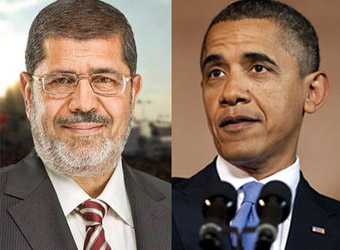An Egyptian criminal court on Tuesday found more than three dozen employees of foreign nonprofit groups, including 16 Americans, guilty of receiving illegal funds from abroad and operating unlicensed organizations in what the United States has criticized as a politically motivated trial that mars Egypt’s transition to post-revolutionary democracy.
The defendants were given prison sentences of one to five years, with many of the Americans receiving the longest ones. But it appears unlikely that any of them will go to prison because most either left the country before the verdict or face suspended sentences.
The guilty verdicts underline Egyptian leaders’ persistent fear of foreign meddling as well as spotlight the institutional disorder that has allowed for politically motivated trials.
Since the revolution that toppled President Hosni Mubarak in 2011, Egypt’s leaders — first a top military council, then President Mohamed Morsi and the Muslim Brotherhood — have occasionally blamed foreign agitators for the country’s problems. At the same time, some of the groups that were singled out had operated in Egypt for years and said they were trying to navigate the process of official registration when investigations against them began.
The sentences came as a shocking twist in a case that has strained Egypt’s relations with the United States, jeopardized $1.3 billion in annual American military aid and amplified concerns about the commitment of Egypt’s new government to opening up the political process.
On Tuesday, Secretary of State John Kerry dismissed the trial as politically motivated and called on Egypt’s leaders to allow the work of nongovernmental groups. “This decision runs contrary to the universal principle of freedom of association and is incompatible with the transition to democracy,” he said in a statement.
The White House said the court’s decision “undermines the protection of universal human rights,” and several senators suggested they would review Egypt’s standing.
Senator Patrick J. Leahy, Democrat of Vermont, called the convictions “appalling and offensive.”
“If Egypt continues on this repressive path, it will be increasingly difficult for the United States to support President Morsi’s government,” he said.
Mr. Morsi issued no public statement on the case, and his aides could not be reached for comment.
The verdict came one day after a prominent activist was sentenced to six months in prison for charges that included insulting the president, and it coincided with the first parliamentary discussions of a new law that nonprofit groups worry will restrict their work.
The case has resonated in Washington since late 2011, when Egyptian security forces raided the groups’ offices, carrying off files, computers and cash, because three of the groups are federally financed and chartered to promote democracy.
One defendant, Sam LaHood, is an official of the International Republican Institute and the son of Transportation Secretary Ray LaHood. Another is the Middle East director of the advocacy group Freedom House and a 24-year veteran of the American Foreign Service.
The National Democratic Institute was also singled out. It and the International Republican Institute had been formally authorized by the Egyptian government to monitor the country’s parliamentary elections in early January 2012.
Last year, the United States flew six American defendants out of Egypt after reaching a deal with the Egyptian government. A seventh, Robert Becker, chose to stay in Egypt in solidarity with his Egyptian colleagues, but he left the country on Tuesday, according to his lawyer, Tharwat Abdel Shaheed.
“It was a verdict to please public opinion after the public was agitated for so long against the Americans and foreign NGOs,” Mr. Abdel Shaheed said.
Khaled Abo Bakr, an Egyptian lawyer and a commentator not involved in the case, said that the defendants who did not receive suspended sentences would have to report to prison before they could appeal. Those returning from abroad could be arrested upon arrival at the airport.
He also said it did seem that the groups had violated Mubarak-era laws, though that was not surprising, given the bureaucratic chaos after the revolution. Even under Mr. Mubarak, many groups had operated in legal limbo without facing prosecution.
Some defendants have viewed the case as a way to take stock of Egypt’s political progress since Mr. Mubarak’s ouster.
Many of them, both Egyptians and foreigners, chose to come to Egypt during the heady days after the revolution because they felt it was time to lay the foundations of a new, democratic system.
Sherif Mansour, an Egyptian activist who sought political asylum in the United States in 2006, returned in 2011 to open the Egypt office of Freedom House.
He spent months navigating the bureaucracy and responding to government officials, who asked for proof he had hired employees and an operating budget, he said.
In December 2011, the government notified Freedom House that its application was complete. Three days later, security forces raided the group’s office, Mr. Mansour said.
He has since left Freedom House, but had hoped that the case would vindicate it and other groups.
“I felt that this revolution would only succeed if NGOs and the judiciary are free and independent, and this was an important case to prove that,” he said. “So far it has been a big disappointment.”
New York Times


